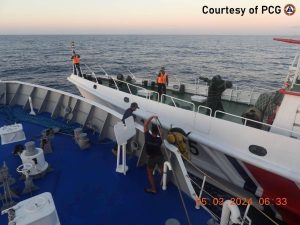Chinese and Philippine vessels have once again collided in a contested part of the South China Sea, the Philippine Coast Guard (PCG) said today, as maritime disputes dominated discussions at a regional summit in Australia.
PCG spokesperson Jay Tarriela said the collision occurred during a routine “rotation and reprovisioning,” or RoRe operation designed to support armed forces personnel stationed in the West Philippine Sea, as Manila refers to its possessions in the disputed waterway.
“Throughout the operation, the PCG vessels faced dangerous maneuvers and blocking from Chinese Coast Guard vessels and Chinese Maritime Militia,” Tarriela wrote in a post on X (formerly Twitter) this morning. “Their reckless and illegal actions led to a collision between MRRV-4407 and China Coast Guard 21555 that resulted in minor structural damage to the PCG vessel.”
Tarriela also posted two videos that appear to show the collision. One video, shot from a drone, shows the two ships colliding as the Chinese vessel seeks to cut across the bows of the PCG ship. Another, shot from the deck of the MRRV-4407, shows Filipino crewmembers attempting to use buoys to cushion the collision, as China Coast Guard personnel film the operation from the opposite deck.
Tarriele said that the mission was “ongoing” and promised to offer more updates.
The collision is just the latest in a long list of incidents that have taken place in the South China Sea over the past 15 months, as China has ramped up the frequency and intensity of its incursions into Philippine-claimed waters. While Tarriela did not say exactly where the collision took place, it is likely to have taken place in the vicinity of Second Thomas Shoal, a submerged feature that lies within the Philippines’ exclusive economic zone.
In recent months, Chinese vessels have mounted numerous operations to impede the Philippine Navy and PCG from conducting RoRe operations to resupply the troops aboard the BRP Sierra Madre, a rusting warship that the Philippines purposefully grounded on the shoal in 1999. This has resulted in several incidents in which Chinese vessels have collided with Philippine resupply boats and deployed high-pressure water cannons to drive away PCG vessels.
The reported collision came as Philippine officials, including President Ferdinand Marcos Jr., called for more unity on the South China Sea disputes in Australia, where the Australian government and the Association of Southeast Asian Nations (ASEAN) are currently holding the second ASEAN-Australia Special Summit.
President Marcos focused on the issue during speeches at the Australian Parliament and at Sydney’s Lowy Institute, where he stated that “the territorial integrity of the Philippines cannot be threatened, and if threats are made, then we must defend against those threats.”
In his keynote address at the Maritime Cooperation Forum on the sidelines of the summit yesterday, Philippine Foreign Minister Enrique Manalo called for the region “to stand firmly together in opposing actions that contradict or are inconsistent with international law.”
“The shared stewardship of the seas and oceans in the region behooves us to unite in preserving the primacy of international law so we can ensure equitable and sustainable outcomes for all,” he said.
In her own speech to the forum, Australian Foreign Minister Penny Wong voiced her country’s support for the Philippines in its attempts to defend its sovereignty, though without mentioning China by name.
“We face destabilizing, provocative and coercive actions, including unsafe conduct at sea and in the air and militarization of disputed features,” she said. She called for a new “preventive architecture” to help “reduce the risk of conflict through miscalculation or misunderstanding.”
Like its ally the United States, which has deepened its security cooperation with the Philippines over the past year, Australia has also pledged support for the country’s maritime security. In November, it conducted joint sea and air patrols with the Philippines in the South China Sea for the first time.
Yesterday, Wong announced A$64 million ($41.8 million) in Australian funding for maritime security for ASEAN countries. Wong did not specify which countries would benefit from the funding said that she “welcomed efforts” by the Philippines, Indonesia, Malaysia, and Vietnam to “delimit their maritime boundaries.”
The issue is likely to continue to dominate the official proceedings and sideline meetings of the summit in Melbourne as it moves towards its conclusion tomorrow.

































